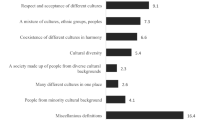Abstract
As an instrument of national strategy, the United States Army has served the American people well for more than two centuries. Its fundamental mission has always been to ‘fight and win America's Wars’. As we have moved from the bi-polar nature of world dynamics to that of the new global neighborhood, the American Army has seen an increase in missions related to peacekeeping, disaster relief, and humanitarian actions. From a geography perspective, the Army must operate in numerous countries simultaneously. To succeed, the Army must go beyond physical accomplishments: it must interact and communicate with nations at a level of shared understanding and enthusiasm of each others culture. The American soldier must understand the cultural nature of geography as well as the physical. The hypothesis of this paper is: There is an urgent need for the men and women of the Unites States Army to have a firm conviction that people of other cultures have beliefs, value systems, and customs that result in behaviors and perceptions that may be vastly different than ours. . .and that those differences are legitimate. Beginning with mistakes made during the Vietnam war, the authors give examples, current as well as past, of cultural illiteracy on the part of the military. The role of the Army in the new world order is then addressed with emphasis on the types of missions to be expected in the 21st Century. The authors point out that significant efforts to grasp customs of foreign countries to which Army units are deployed have been made during recent years; however, much remains to be accomplished. The solution to a lack of cultural awareness is given in the form of improvements to the Army military education system. An overview of the current training environment, with its strengths and weaknesses, is provided as a precursor to recommendations for future training. A multitiered education system is proposed in which cultural awareness education is provided at all levels of authority, from the basic training recruit to senior officers. Given that programs of instruction are already full, it will take a combination of command emphasis and innovation to accomplish the goal of inculcating cultural awareness in the American Army. The paper concludes with the position that the only way the Army can accomplish its changed global missions is by first winning its own war against cultural illiteracy.
Similar content being viewed by others
References
Christman, Daniel W.: Lieutenant General. Superintendent's Command Information Briefing to United States Military Academy Staff and Faculty. West Point, New York, September 1996.
Grubbs, J.H.: Colonel. Department Head, Department of Geography and Environmental Engineering, United States Military Academy, Interview with co-author, West Point, New York, 5 August 1996.
Grubbs, J.H.: Guidance for Teaching. Electronic mail distributed to faculty of the Department of Geography and Environmental Engineering, United States Military Academy, West Point, New York, 6 September 1996.
Faculty Survey: Conducted by the authors at United States Military Academy January-February 1996.
Merrill, M.S.: Academic Individual Advanced Development 'south and South East Asia After Action Report', West Point, New York, August 1995.
Palka, E.T.: Lieutenant Colonel. ‘The United States Army in Operations Other than War: A Time to Revive Military Geography,’ GeoJournal 37,2 (October 1995).
Philpott, T.: Enforcing Peace in Bosnia. The Retired Officer's Magazine, pp 60–66 (September 1996).
United States Army. Army Vision 2010, 1996.
United States Army Center for Army Lessons Learned. Handbook for the Soldier in Operations Other Than War (OOTW), Fort Leavenworth, Kansas, July 1994.
United States Military Academy Task Force on Cultural Perspective in the Curriculum. ‘Culture Goal Program Assessment 1995-1996’, West Point, New York, July 1996.
United States Department of Geography and Environmental Engineering. Course Book 1996-1998, West Point, New York, December 1995.
Author information
Authors and Affiliations
Rights and permissions
About this article
Cite this article
Thompson, D.M., Grubbs, J.H. Embracing cultural geography: an army imperative. GeoJournal 44, 35–41 (1998). https://doi.org/10.1023/A:1006889231102
Issue Date:
DOI: https://doi.org/10.1023/A:1006889231102




